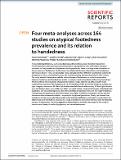Four meta-analyses across 164 studies on atypical footedness prevalence and its relation to handedness
Abstract
Human lateral preferences, such as handedness and footedness, have interested researchers for decades due to their pronounced asymmetries at the population level. While there are good estimates on the prevalence of handedness in the population, there is no large-scale estimation on the prevalence of footedness. Furthermore, the relationship between footedness and handedness still remains elusive. Here, we conducted meta-analyses with four different classification systems for footedness on 145,135 individuals across 164 studies including new data from the ALSPAC cohort. The study aimed to determine a reliable point estimate of footedness, to study the association between footedness and handedness, and to investigate moderating factors influencing footedness. We showed that the prevalence of atypical footedness ranges between 12.10% using the most conservative criterion of left-footedness to 23.7% including all left- and mixed-footers as a single non-right category. As many as 60.1% of left-handers were left-footed whereas only 3.2% of right-handers were left-footed. Males were 4.1% more often non-right-footed compared to females. Individuals with psychiatric and neurodevelopmental disorders exhibited a higher prevalence of non-right-footedness. Furthermore, the presence of mixed-footedness was higher in children compared to adults and left-footedness was increased in athletes compared to the general population. Finally, we showed that footedness is only marginally influenced by cultural and social factors, which play a crucial role in the determination of handedness. Overall, this study provides new and useful reference data for laterality research. Furthermore, the data suggest that footedness is a valuable phenotype for the study of lateral motor biases, its underlying genetics and neurodevelopment.
Citation
Packheiser , J , Schmitz , J , Berretz , G , Carey , D P , Paracchini , S , Papadatou-Pastou , M & Ocklenburg , S 2020 , ' Four meta-analyses across 164 studies on atypical footedness prevalence and its relation to handedness ' , Scientific Reports , vol. 10 , 14501 . https://doi.org/10.1038/s41598-020-71478-w
Publication
Scientific Reports
Status
Peer reviewed
ISSN
2045-2322Type
Journal article
Description
Funding: Deutsche Forschungsgemeinschaft (DFG) through the Research Training Group “Situated Cognition” (GRK 2185/1) and Grant number OC 127/9-1. The UK Medical Research Council and Wellcome (Grant ref: 102215/2/13/2) and the University of Bristol provide core support for ALSPAC. This publication is the work of the authors and S.P. and J.S. will serve as guarantors for the analysis of the ALSPAC data presented in this paper. J.S. is funded by the DFG (Project number: 418445085). S.P. is funded by the Royal Society. D.P.C. is funded by the Leverhulme Trust. Open Access funding was provided by Projekt DEAL. We acknowledge the support by the DFG Open Access Publication Funds of the Ruhr-Universität Bochum.Collections
Items in the St Andrews Research Repository are protected by copyright, with all rights reserved, unless otherwise indicated.

